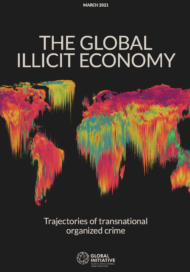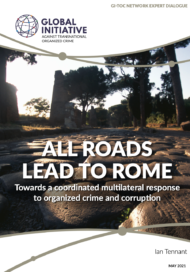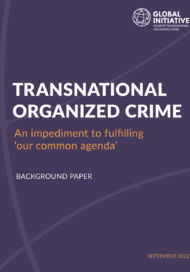Posted on 09 Sep 2021
Several key UN discussions on organized crime will take place in Vienna later this year – and civil society’s voice must be heard.
As the European summer draws to a close, Vienna-based diplomats and UN staff are preparing for a range of discussions on how to prevent and counter transnational organized crime. These expert discussions should form a key part of international efforts to achieve the UN Sustainable Development Goals, in particular the peaceful societies committed to in Goal 16.
Although an inclusive and cross-societal process is essential to formulating an effective response to transnational organized crime, the space for civil society to engage at the UN has been shrinking across the board, and member states in Vienna have frequently excluded civil society from their discussions and negotiations. There are however several opportunities for civil society to engage with the Vienna agenda through the final quarter of the year and beyond.
October: Commission on Narcotic Drugs (CND)
Between 19 and 21 October 2021, the CND (the main UN policymaking body on drugs) will hold a thematic intersessional meeting to discuss the links between drug trafficking and other forms of transnational organized crime, including money laundering from drug trafficking and drug trafficking online. This meeting is part of the CND’s follow-up process to the 2019 Ministerial Declaration, which was intended to accelerate the implementation of various policy commitments aimed at countering the world drug problem.
The perspectives of civil society individuals and groups will be vital for a meaningful discussion of the topics at the meeting. Fortunately, the CND intersessional meetings have become relatively open and accessible for civil society working on drugs issues over recent years. This year there will be 15 NGO speaking slots during the three days, coordinated by the Vienna NGO Committee on Drugs, the umbrella body for civil society at the CND. Speakers can apply for a slot to present their work to the meeting using this form. Applications must be received before 20 September.
November: Commission on Crime Prevention and Criminal Justice (CCPCJ)
Following the 14th UN Congress on Crime Prevention and Criminal Justice in Kyoto in March, the CCPCJ adopted a resolution committing to a series of intersessional meetings to follow up on the commitments made at the congress. The first such meeting is scheduled to take place between 10 and 12 November, with a focus on crime prevention, economic dimensions of crime and youth and gender perspectives in responding to crime.
The GI-TOC has previously highlighted the state-centric nature of the congress’s outcomes and preparatory process (at the expense of civil society) and was disappointed by the congress’s lack of a clear call to action, or even a meaningful articulation, of the nature of the threat of transnational organized crime. Despite this, the intersessional process does offer an opportunity to reboot and revitalize these discussions if a wide range of expert civil society voices are included in the follow-up process. For updates on how civil society can engage with the CCPCJ, see the Alliance of NGOs on Crime Prevention and Criminal Justice.
November: UN General Assembly review of Global Plan of Action against Trafficking in Persons
The UNODC in Vienna plays a key role in implementing the UN’s Global Plan of Action. A High-Level Meeting of the plenary of the UN General Assembly will take place (in New York) on 22–23 November 2021 to evaluate the progress made in implementing the initiative. Although the meeting takes place in New York, it has a direct impact on programmatic work of the UNODC on trafficking in persons. The GI-TOC has provided input to the consultative process ahead of the plenary meeting. Information on the meeting can be found here.
December: Ninth conference of states parties to the UN Convention against Corruption (UNCAC)
Between 13 and 17 December, the states parties to the UNCAC will gather for their ninth conference in Sharm El-Sheikh, Egypt (with some form of online participation as well). This conference comes after June’s UN General Assembly against Corruption, the political declaration of which included only limited progress beyond the agreements made in the convention itself. The links between transnational organized crime and corruption were barely mentioned in the declaration, despite the fact there is a pressing need for a more coordinated approach to these phenomena.
The last conference, in 2019, saw several resolutions adopted on a broad range of topics. Civil society will be hoping for an open and inclusive conference, especially in light of the exclusion and detention of a Serbian journalist at the 2019 conference, held in the UAE. Follow the UNCAC Coalition for updates as to how civil society can engage at the 2021 conference.
Ongoing: Cybercrime
The rise of the internet has played a key role in the explosion in growth of illicit markets since the UN Convention against Transnational Organized Crime (UNTOC) was adopted some 20 years ago. Member states are now committed to developing a new UN treaty on cybercrime, following this May’s adoption of modalities for an ad hoc committee to develop such an instrument. The scope of such a treaty has yet to be defined, but its reach and impact could be significant. Negotiations are likely to be fraught on matters of cyberspace, human rights and freedom of speech, as well as how to address the multifaceted ways in which illicit markets thrive online.
Again, civil society has vital insights and experience that need to be heard. The ad hoc committee, chaired by the Algerian Permanent Representative in Vienna, will hold six official meetings split between Vienna and New York, commencing in January 2022. Between now and then, member states in Vienna are negotiating the agenda for the first meeting – including how civil society should be involved. The GI-TOC will continue to engage with and monitor this process, and provide updates.
Ongoing: the UNTOC Implementation Review Mechanism
Outside of the conference rooms, government focal points and designated experts are beginning the process of country reviews under UNTOC’s Implementation Review Mechanism. Non-governmental actors have a central role to play in reviewing states’ performance against their commitments under the convention, despite the narrow role afforded to them in the mechanism’s rules. With the support of the GI-TOC and the UNODC Civil Society Team, civil society is preparing itself and engaging with governments and other stakeholders in some countries. See the GI-TOC’s overview for how to engage with the mechanism.



